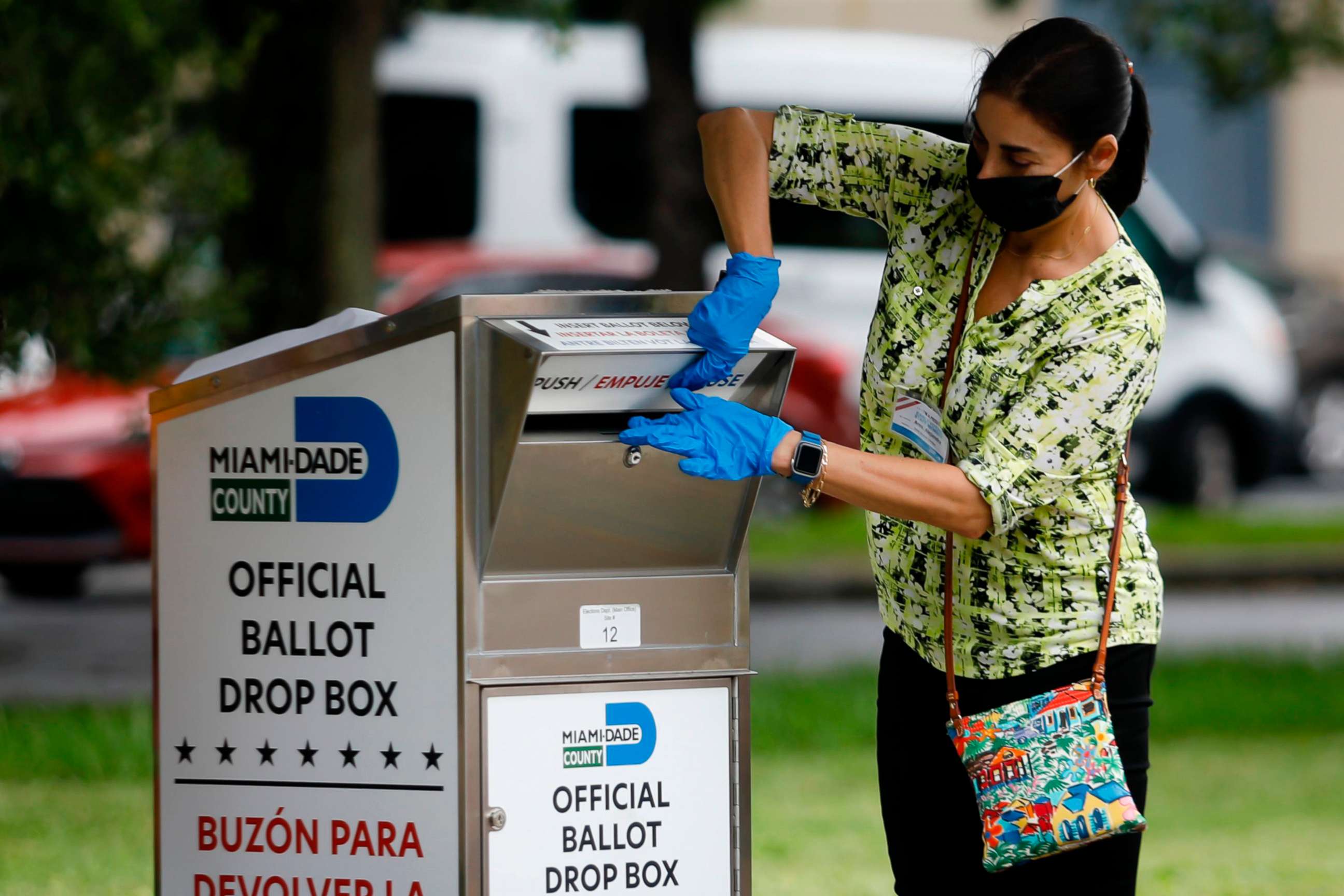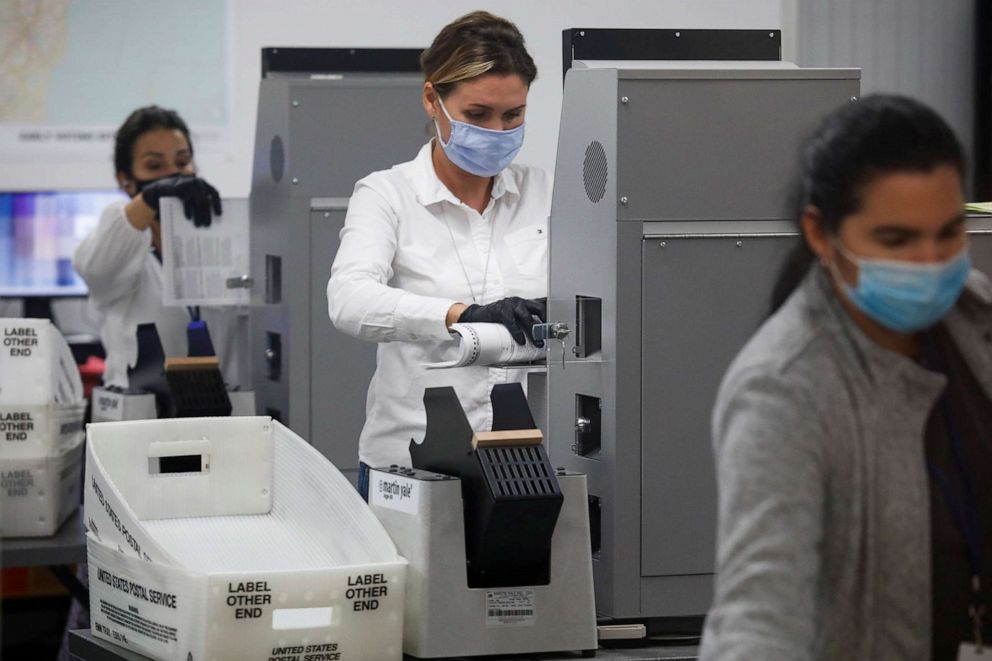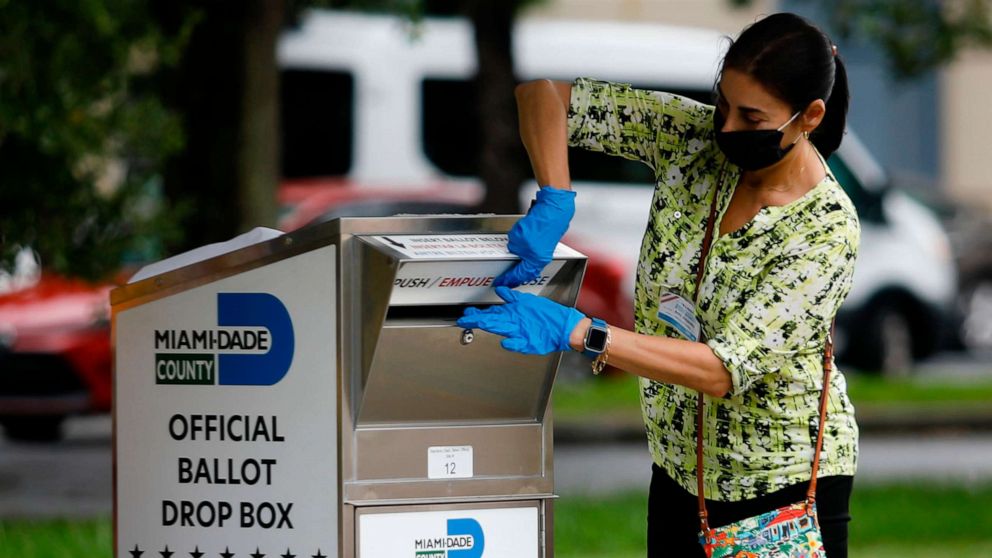Florida lawmakers working to make changes to state voting laws before session ends
Following the first recent election cycle where Democrats outpaced Republicans in voting-by-mail, lawmakers in Florida are working down to the wire to make changes to state voting laws.
The Florida Senate passed a bill Monday that, in part, limits the use of ballot drop boxes and changes the number of elections a single vote-by-mail application covers. One Republican -- Sen. Jeff Brandes -- broke with his party, joining Democrats, who universally opposed the legislation.
The bill heads to the House, which has its own omnibus elections bill, HB 7041, that is similar but not identical to SB 90. It has not passed the House yet.
Time is running out for lawmakers to pass a bill through both chambers, as Friday is the last day of the regular session.
The Florida Supervisors of Elections, an association representing the state's 67 county election supervisors, is opposed to both bills, a spokesperson told ABC News Monday.
The bills are part of the nationwide effort among Republican state lawmakers to advance legislation that, according to the Brennan Center for Justice, imposes new restrictions on voting since the 2020 election, which former President Donald Trump falsely alleged was stolen and fraud-filled.

Georgia's sweeping election overhaul sparked backlash, infuriating Republicans who said it increases voter access and enhances security. But voting rights activists and Democrats claim Georgia's bill, and others being considered in states like Florida and Texas, are in response to Trump's false claims and meant to suppress turnout among minority communities that tend to vote Democratic.
"Despite this flawless election, we're looking at this because it's based on the big lie and the discredited claims that the 2020 election was rigged," said Sen. Lori Berman, D-Fla.
"Florida has the worst record of voter suppression in this country -- and it's not even close," said Democrat Randolph Bracy. "I believe that we are just continuing a legacy -- an ugly legacy -- in this state if we pass this bill."
Florida Republicans' defense echoed Georgia Republicans.
"The goal for everybody is to make it as easy as possible to vote, and as hard as possible to cheat," said Sen. Joe Gruters. "When I hear my colleagues stand up and talk about restrictions and suppressing voters ... it's disappointing because this does nothing to suppress the vote."
The 40-page Senate bill makes changes to the state's election statutes. Some of the most controversial provisions are gone and Democrats have conceded the bill improved since it was first filed.
Originally, drop boxes would have been banned altogether. That was amended to allow them at election supervisors' office branches and sites approved for early voting. The boxes must be physically monitored and should only be accessible when those locations are open -- making them inaccessible on Election Day and one or two days prior, depending on the county. While the House bill has a provision that would allow for some 24-hour drop boxes under video surveillance, it also has language requiring voters present an ID when returning a ballot to an employee-monitored drop box.

Under current law, a single application to vote-by-mail can cover two general election cycles, but this bill lessens that to just one general election cycle. The original text would've wiped out all requests made that were meant to guarantee voters' get ballots mailed to them for every election through the 2022 cycle. Now, those requests will be "grandfathered in," so voters won't have to re-request ballots and election officials won't have to process the same requests again. The House bill has the same provisions.
Both bills will attempt to ease the burden on election officials by codifying a 2020 executive order allowing counties to begin mail-ballot canvassing as soon as the automatic tabulation equipment testing is complete.
While Florida didn't mass mail ballots to active registered voters, other states that normally would not do this -- like New Jersey and Vermont -- did. Both bills prohibit state or local agencies from sending mail ballots to any voters unless a request is made.
The bills also add a requirement that voters provide their driver's license number, state identification card number or last four digits of their social security number when updating their voter registration record or requesting a mail ballot.
They also both expand the no solicitation zone outside polling places from 100 feet to 150 feet and apply that zone to drop boxes. Only SB 90 adds language specifying that solicitation includes "giving or attempting to give any item to a voter," which would mean that, unless someone is an employee or volunteer with an election supervisor's offices, handing out food or water within that area is illegal.




